Georgia's surprising LGBTQ+ scene
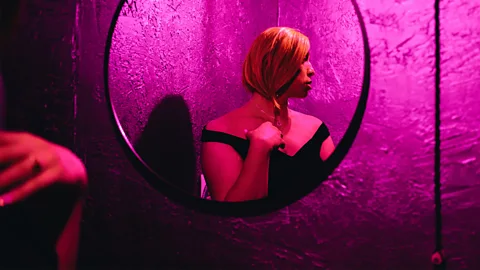 David Koridze
David KoridzeIn socially conservative Tblisi there is a thriving LGBTQ+ scene, with comedy, clubbing and art at its core. James Jackson meets some of the key players.
Nata Talikishvili never wanted to be a comedian. With a career that ranges from sex worker to club bouncer, Talikishvili uses her acerbic humour to expose society's hypocrisy, telling true stories that make light of her own difficult experiences as a trans woman in the transphobic culture of Georgia. She turns up to her interview with BBC Culture an hour late, waving a fan coquettishly, and her comic talent oozes out to such an extent that the translator keeps bursting into laughter during our conversation.
More like this:
One of the main targets of her stories are the country's Orthodox priests, who according to Talikishvili are both key culprits in whipping up Georgian society's hatred, and at the same time, she jokes, make up a large chunk of her client base. An annual march for family values organised by the Church is one of her busiest working days she says, because so many priests visit Tblisi from the countryside. "I bless them in the morning and then send them to the demonstration," she quips.
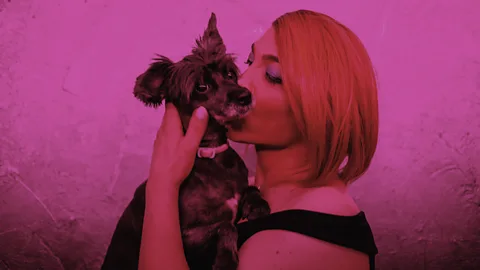 David Koridze
David KoridzeIn Georgia violent marches against LGBTQ+ people attract tens of thousands on to the streets, and hateful diatribes on TV and social media. According to a recent survey, 84% of Georgians think same-sex relations are always wrong, making it, according to these survey results at least, one of the most homophobic countries in Europe, even more than neighbouring Turkey.
Yet in the Georgian capital Tblisi there is a thriving, tight-knit underground LGBTQ+ scene, spearheaded by techno clubs such as Bassiani but also spreading into cinemas and galleries and onto stages. Georgia's vibrant and hedonistic culture was moulded and repressed by the socially conservative Soviet Union that it became a part of in 1922 until its disbanding in 1991. It is only now that people are reclaiming and reviving this heritage in Georgian culture and art.
When Talikishvili was five, living in a remote Georgian village, she announced to the world that she was a girl. In such a traditional and religious country, it was considered remarkable that her grandparents supported her decision and raised her happily as a girl. But when they died, she had to move to the capital of Tblisi to make a living. Aged just 14, she says she felt she had no option but to start sex work.
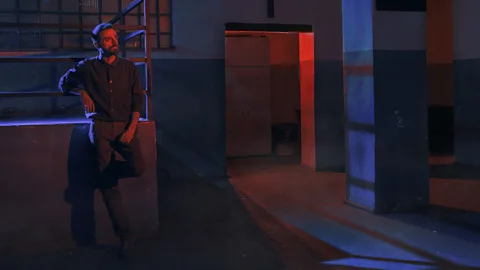 Iris-saane van der Aar
Iris-saane van der Aar"It was really difficult," she says, dropping her jokey manner for just a moment. Many landlords refuse to rent to trans people, she explains, and so a lot are forced to live on the street. There was even a lot of division among the trans sex workers. "Back then it was wild, everyone was against each other. I was just trying to survive." And though the red light district was far from safe, it was also the only place Talikishvil could express herself as a woman.
On the street, things are now much safer for LGBTQ+ people in Georgia, but much of the public debate takes place on Facebook. Someone will share a transphobic video saying that they will kill trans people and threatening their lives, says Talikishvi, then she will comment and post a screenshot of them asking her for sex. "The videos usually disappear afterwards," she notes wryly. "These men [clients] are not from an alien planet, they are part of Georgian society."
Alongside sex work, Talikishvili worked for years as a club bouncer, earning just 60 lari (the equivalent of about £20) for a whole night shift, which could last until 11am. "I did it to show the people who would come that there is nothing scary about being trans. I did it as [a kind of] activism. Even inside the queer community, and queer groups on social media, there was a lot of transphobia before. The community has to overcome [that] because if even the queer community can't then who can."
One evening while working as a bouncer at a club, she went inside to see some friends and started chatting and gossiping. A crowd gathered organically, listening to her tales. The club's owner went looking for Talikishvili, and when she saw the throng of people around her, she knew that she had to get Talikishvili on stage. She is now performing fortnightly. That club was Bassiani, a hub for Tblisi's underground scene.
"Our original goal was not just a techno club," says Giorgi Kikonishvili, founder of Georgia's first LGBTQ+ event, Horoom Nights at Bassiani, which started in 2016, "but a kind of underground base for all sorts of social movements in Georgia… those of queers, women, the left, the green movement. So the DNA of the club is not just music and techno, we see the club as a political place."
Though named after an all-male Georgian martial dance, Khorumi, the nights, soundtracked by house and techno, wouldn't be out of place in Berlin. Kikonishvili tells BBC Culture he was inspired by a huge homophobic counter-demonstration in 2013, when 20,000 protesters trapped him and about 30 other activists in a bus. "I knew at that moment I had to emigrate or change my country." He opted for the latter, launching an array of cultural and political projects. "Half of Georgian society now thinks gay people should be allowed to protest publicly," he says. "Ten years ago we could have fitted all the people who thought that in this room."
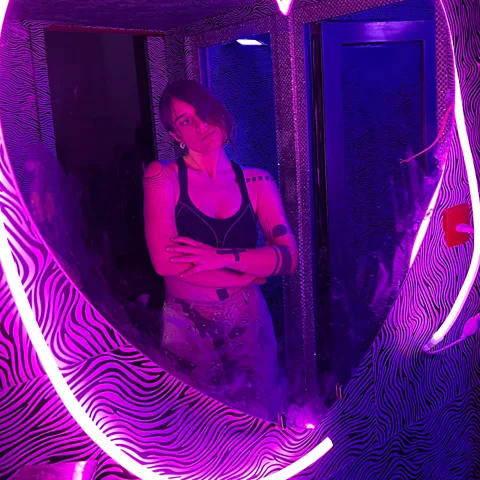 James Jackson
James JacksonDuring the day, Kikonishvili works with artist and activist Tekla Tevdorashvili and others at the Fungus Gallery, an LGBTQ+ art collective and gallery in a quiet corner of Tblisi that invites artists from across the Caucasus region. Tevdorashvili says it is hard to understate the importance of club culture in these social changes. "Nightlife changed the whole context of how Georgian society perceives queer people. Clubs were the first place to offer them a safe space, and now the attitude people have in the clubs is shifting to daylight."
Another hotspot for Tblisi nightlife is Success bar, the oldest gay bar in the entire Caucasus. Its owner Nia Gvatua initially just wanted to redecorate the somewhat dingy place so that she could make it worth visiting for the local community. Five years ago, after asking around, she was invited to meet with a local businessman, who proceeded to open his safe and gave her $20,000 cash on the spot. She set about transforming the bar into a cultural hub. "When I began, it was more about aesthetics. I was really into electronic music for many years, so when I began, I was more focused on which DJs I wanted to book and what cocktails I wanted to make." A linchpin of the Tblisi LGBTQ+ scene who has shared style tips with Vogue, Gvatua documents the scene with photography, and directs drag shows at Success, Bassiani and other venues.
Resistance and resilience
But Tevdorashvili and others wanted to get involved in more than just clubs, so they set up Fungus, where they recently put on Resilience, a group exhibition of photography and multimedia art dedicated to trans women. Named as such because fungus comes from the dark underground, Fungus's motto is "we thrive wherever we get even a little chance to grow," and it's located next to Klara's bar, where Talikishvili performs fortnightly. Though the reception from the locals was initially awkward, things have warmed up a lot recently, with one man coming recently to tell them "respect from the neighbourhood!".
For Tevdorashvili, this need for safe spaces is all too real. A few years ago she put an art installation up in a public park days before the annual church-organised "day for family purity". The installation was a rainbow-coloured box entitled "Closet", with handwritten notes from the LGBTQ+ community, which played a speech and then the Diana Ross song Coming Out. She had only told a few trusted blogs about it in advance, but it was attacked by a far-right activist within just a few hours of being up. Tevdorashvili recognised him from demonstrations. The police came but they advised against putting the artwork back up. This was a setback, she says, but not a defeat: "What we artists and activists has gone through have only made us stronger."
Kikonishvili agrees. "It's not like homosexuality was invented in Georgia after the breakup of the Soviet Union," he laughs. Though it was briefly made legal after the October revolution, Joseph Stalin (born in Georgia as Iosip Jugashvili) criminalised homosexuality again in 1934, with the strong support of author Maxim Gorky. (The freedom of same-sex sexual activity was not officially enshrined in law in Georgia until 2000, and, of course, despite that legality, social acceptance has been another matter.)
Kikonishvili points to the Berikaoba festival, which he says is celebrated across the country by cross-dressing, drinking and feasting, as well as the popularity of gay Georgian cultural figures like the famed Tblisi-born director Sergei Parajanov and traditional dancer Vakhtang Chabukiani, as evidence of the shallow roots of contemporary homophobia in Georgia. "Chabukiani is the most beloved Georgian dancer ever, and he was gay and everyone knew it." Parajanov, however, was persecuted by the Soviet authorities for his sexuality as much as for his subversive filmmaking.
Sandwiched between Russia and Turkey, with its own alphabet, and a long history of visiting traders from the Silk Road, Georgia was known for scenes of hedonism at its sulphur baths in Tblisi, and has the oldest wine culture (viniculture) in the world.
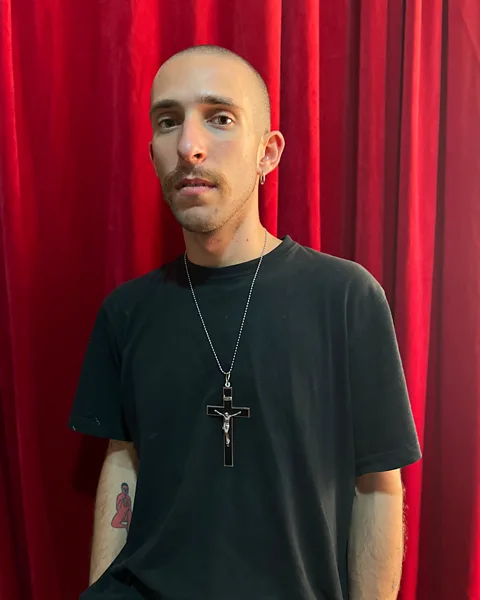 James Jackson
James JacksonDavid Apakidze, co-curator of Fungus and art historian, agrees. "We are trying to tell the true history of our art. In the Soviet Union a lot of queer artists were hidden. Some art researchers reclaimed them and took their art from archives, but no one says they're queer." Apakidze's book, 100 Years of Georgian Queer Art, is due to come out later this year.
"There are a lot of things that can be reclaimed as queer," says Apakidze. "Theatre and costume designer Petre Otskheli was killed in the 30s by the Soviet regime. Elene Akhvlediani, a famous Georgian painter, was a lesbian woman wearing men's clothes, and no one says she's queer."
Many of the most famous LGBTQ+ Georgian artists today find themselves living outside the country, though they sometimes take their experiences of homophobia with them. Balenciaga's lead designer Demna Gvasalia, recently told New York Times Style "growing up in a country where I couldn't say I was gay, I always tried to look like the kind of tough guy who would survive in the neighbourhoods where I lived. I can't go back to Georgia because people have threatened to kill me if I return… my own uncle is one of them."
Levan Akin's 2019 film, And Then We Danced depicted a gay romance among young dancers at the prestigious Georgian National Ensemble. Like Giorgi Kikonishvili, he too was inspired by the homophobic riot in 2013. By origin Georgian, Akin was a frequent visitor there growing up and speaks the language, but grew up in Sweden, where he still lives now. His film scandalised conservatives in Georgia by combining the national dance with a gay coming-of-age drama, inspiring protests across the country. While filming they had to lie about the film's content because the plot was so controversial.
His new film Passage, which comes out later this year, tells the story of a Georgian woman who travels to Istanbul to find her niece, a trans woman. "The genesis of the idea came when I heard a story while doing research for And Then We Danced about the relative of a trans woman who was the only one standing by her. This made me think of telling a story from the perspective of a family member, showing their journey and growth." He notes that the success of And Then We Danced has made it harder to film surreptitiously this time.
Viewers of the 2019 film may be able to recognise Nata Talikishvili, who plays herself in a cameo role. Akin told BBC Culture that Talikishvili is "a natural actress" as well as "very witty, and candid", and while researching the film he talked with her to learn more about queer life in Tblisi.
Discussing the possibility in the future of joining the many trans people who have left Georgia for asylum in Europe, Talikishvili mentions how she loves Ireland's pub storytelling tradition. When I mention that Ireland is quite a conservative country, she smiles – "that's fine. I am a conservative woman".
And if you liked this story, sign up for the weekly bbc.com features newsletter, called The Essential List. A handpicked selection of stories from BBC Future, Culture, Worklife and Travel, delivered to your inbox every Friday.
